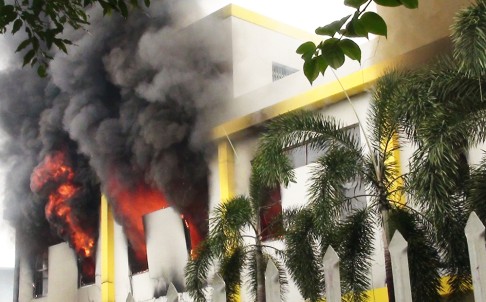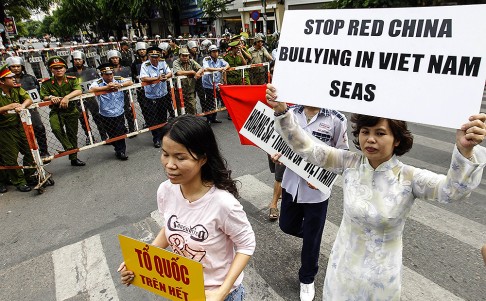- Joined
- Aug 12, 2009
- Messages
- 10,569
- Likes
- 25,230

A riot at a steel plant in Vietnam has left one Chinese worker dead and over 100 injured, officials said Thursday, as an angry Beijing accused Hanoi of "connivance" in the worst anti-China unrest in decades.



Anti-Chinese Violence Turns Deadly and Spreads in Vietnam[/URL]http://www.channelnewsasia.com/news/asiapacific/one-dead-100-hurt-as-anti/1107714.html
HANOI: A riot at a steel plant in Vietnam has left one Chinese worker dead and over 100 injured, officials said Thursday, as an angry Beijing accused Hanoi of "connivance" in the worst anti-China unrest in decades.
Long-simmering enmity between the neighbors has boiled over in Vietnam with protests in major cities and mobs torching foreign-owned factories after China deployed an oil drilling rig in contested waters.
Worker demonstrations have spread to 22 of Vietnam's 63 provinces, the government said, calling for "tough measures" to bring the situation under control before alarmed foreign investors pull out of the country.Hundreds of Chinese nationals have fled across the border into neighbouring Cambodia, according to police there.
The latest riots broke out Wednesday at a steel mill owned by Taiwanese group Formosa Plastics in Vietnam's central Ha Tinh province, around 500 kilometres from Hanoi.Formosa said the trouble had begun when Vietnamese workers at its plant staged a strike which quickly became violent.Workers began "attacking some Chinese workers and damaged offices and equipment," it said in a statement.
"One Chinese male worker was killed in the chaos," local official Dang Quoc Khanh told AFP, adding that three houses at the Formosa plant for Chinese workers had been destroyed.At least 149 people were injured, Khanh told state-run VTV, adding that police had arrested 76 people and opened an investigation."The rioters have gone but we are all still concerned they might come back," Taiwan's de facto ambassador Huang Chih-peng said, adding that no Taiwanese nationals were hurt.
China accused Hanoi of acting in concert with the protesters.
The violence in Vietnam had "a direct link with the Vietnamese side's indulgence and connivance in recent days with some domestic anti-China forces and lawbreakers," Beijing's foreign ministry spokeswoman Hua Chunying told reporters.China's official news agency Xinhua said that around 10 Chinese remained unaccounted for after rioters attacked four Chinese companies in the central province of Ha Tinh, citing a Chinese manager.Beijing also issued a warning to tourists planning trips to Vietnam, advising them to "carefully consider" their plans.
The backdrop is a history of rivalry between the neighbours, who have close economic ties but often fraught diplomatic relations, particularly over the contested Paracel and Spratly islands in the South China Sea.In 1974, as US troops withdrew from Vietnam, China invaded the Paracel Islands, which were held by the US-backed South Vietnamese regime.The neighbours fought a brief but bloody border war in 1979 after China invaded following Vietnam's intervention in Cambodia to oust Beijing's Khmer Rouge allies.
They came to blows again in 1988 in the contested Spratly islands in a naval battle in which more than 70 Vietnamese sailors were killed.However, the two countries normalised relations in 1991 and their economic fortunes have become increasingly intertwined.
Beijing's increasing assertiveness in staking its claim to almost all of the South China Sea also has caused concern for other neighbouring countries, particularly the Philippines.Tensions flared earlier this month after Beijing moved a deep-water drilling rig into waters that Hanoi claims -- a move Vietnam has denounced as "illegal".There have been repeated skirmishes near the controversial oil drilling rig in recent days involving vessels from the two countries, with collisions and the use of water cannon.
The widespread unrest has broken out since Vietnam's rulers -- who usually tightly control dissent -- allowed rallies against Beijing at the weekend.Prime Minister Nguyen Tan Dung described the situation as "very serious" and said that, while the recent groundswell of patriotism was "the correct thing", instigators who broke the law would be punished, according to an official statement.
In the southern province of Binh Duong, riot police were deployed Wednesday after anti-China riots and arson attacks forced several factories to temporarily suspend operations, including a supplier for Nike and Adidas.Police said they had detained some 500 people after nearly 20,000 workers poured onto the streets Tuesday and began looting and attacking security guards and factory management before setting fire to at least 15 factories.
Export-orientated manufacturing is a key pillar of Vietnam's economy, with high-profile firms -- from electronics giants such as South Korea's Samsung to US sportswear companies -- producing goods there.Taiwan is one of the top foreign investors in Vietnam.






 Vietnam can't even stage a riot without botching it up.
Vietnam can't even stage a riot without botching it up.